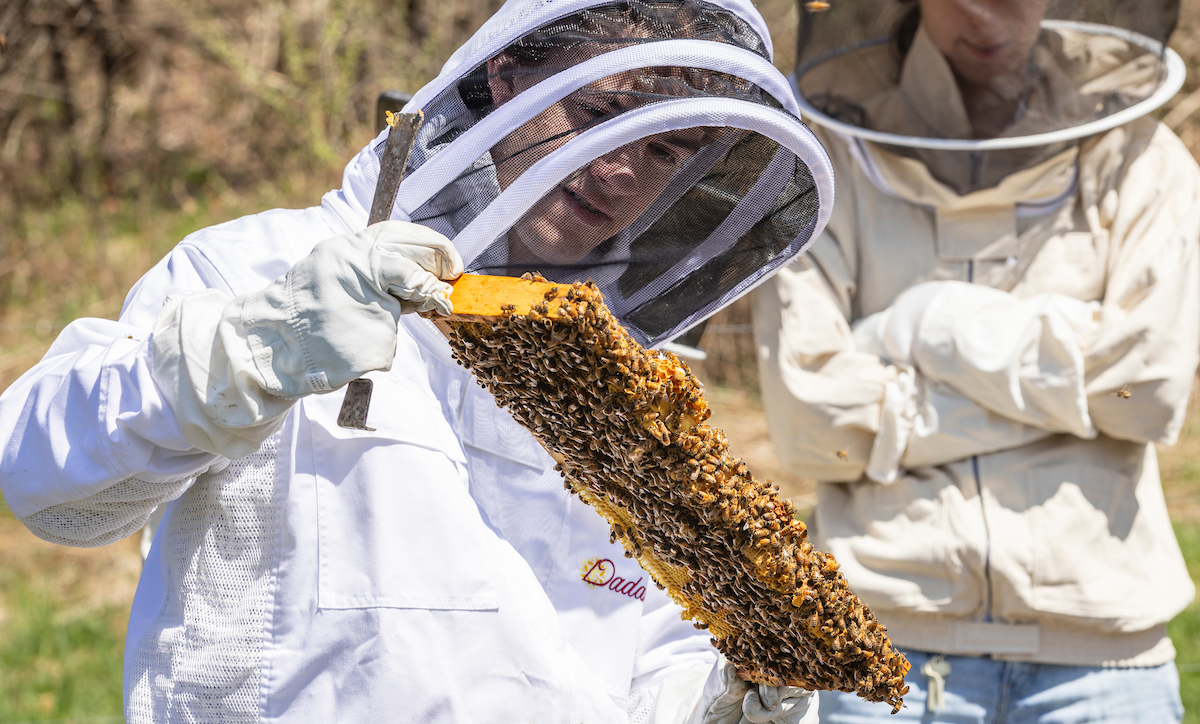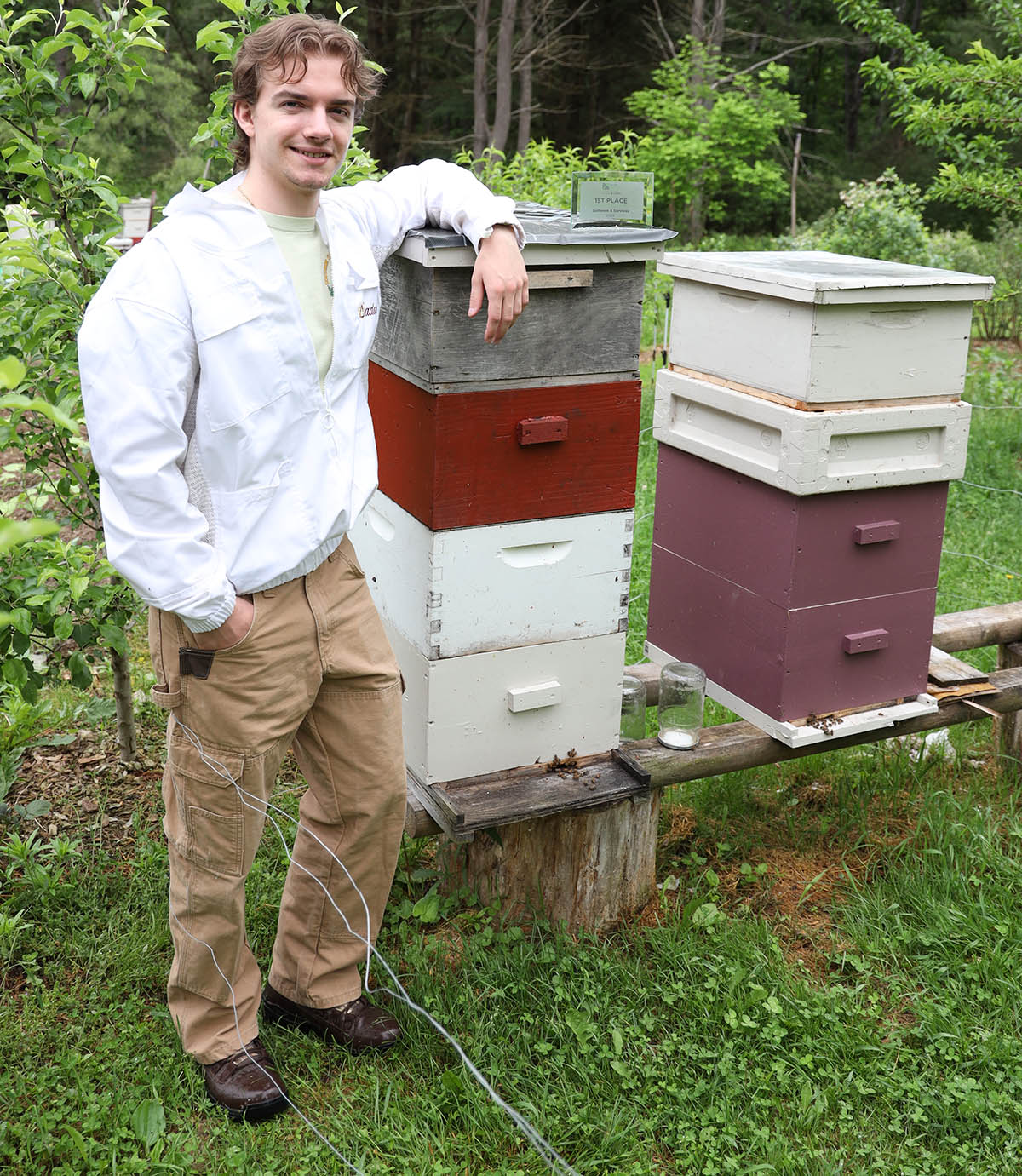Hive mind: Award-winning student startup seeks to learn the language of bees
BuzzHive wants to help beekeepers maintain the health of honeybees

Mike Bronikowski is working on understanding the language of honeybees, trying to translate their buzzing into understandable data that will allow beekeepers to help bees survive growing threats from climate change, pests and other environmental changes.
That’s the idea behind BuzzHive, Bronikowski’s startup pitch that recently took first place in the Software & Services category at the New York Business Plan Competition.
BuzzHive aims to use solar-powered sensors in beehives that will report data to a mobile app. In addition to temperature, humidity and weight – which could tell users how many bees and how much honey is in the hive – Bronikowski is looking to further develop the interpretation of audio data from the sensor.
He plans to use machine learning and artificial intelligence to decipher between the different types of buzzing bees make, which would then alert beekeepers to monitor hives for issues related to excess moisture, mites and other problems that they face.
“The premise of the technology is to translate bee language into human language in a sense,” Bronikowski said. “It’s using technology to decompose signals from the beehive into actionable items that beekeepers can do to help their hives survive. Or it gives them the insights to help understand what’s going on in their hive. Sensors can pick up on data when something’s out of equilibrium, and when BuzzHive is connected to your device, it’ll notify the beekeeper that something’s wrong and what it is that’s going wrong.”
The New York Business Plan Competition prize comes with $10,000 in funding and support from the Upstate Capital Association of New York.
“This prize money enables us to make this a reality, and to work on the hardware and the software and put it all together,” Bronikowski said. “It gives us a launchpad that we wouldn’t be able to do it without it.”
A Binghamton University senior studying applied physics and mathematical sciences who is planning to enter the Watson College master’s program in computer science, Bronikowski grew up in Vestal, N.Y., doing beekeeping as a hobby with his father, Ireneusz. It was a family tradition from their native Poland and has been something they have enjoyed for the health benefits of eating local honey, a remedy that helps many people with allergies.
Bronikowski’s home setup of about 25 hives, Ross Hill Apiary, sells excess honey to family and friends. He is, however, more interested in connecting with and educating others through the Southern Tier Beekeepers Association and as the former president of the Binghamton University Bees Club.
Bronikowski came to Binghamton University with dual interests in physics, inspired by his high school physics teacher, Peter Klimas, and entrepreneurship, having participated in the Future Business Leaders of America club. He has also been engaged with the Koffman Southern Tier Incubator throughout his time as a student, having worked on developing startups including HomeHives – a service that would have allowed individuals to host hives at their homes and have them serviced by expert technicians – and FineMining, which provided an authorization and verification service for people buying and selling high-end computer parts online.
Those previous ideas never quite got off the ground. Bronikowsi did launch FineMining, but the cryptocurrency bubble cut the demand for consumer crypto mining hardware. Yet he doesn’t look at his past experiences as failures. They have taught him valuable lessons as he forges ahead with BuzzHive.
One of the greatest lessons he learned is that teaming up with others is key to developing the science behind his ideas and building out a business strategy. Bronikowski has leaned on the expertise of Luke Riddoch ’24, who was vice chair of the Watson Combat Robotics League as a student and is helping to design the BuzzHive sensor hardware. Riddoch had worked on the development of the solar panel on the Lois B. DeFleur Walkway that rotates to maximize its amount of power generation.
Bronikowski is also fortunate for the support he has received from Osterhout Assistant Professor of Entrepreneurship Chou-Yu (Joey) Tsai in the School of Management. Tsai pushed Bronikowski to be data-driven throughout his preparation for the New York Business Plan Competition, and he traveled to Albany to be there for Bronikowski’s presentation. When BuzzHive was announced as the winner, it was a special moment for the student and the faculty member both.
“Joey started getting emotional,” Bronikowski said. “That shows you the connection that faculty have with students. They really care and they’re invested. It’s real. And I’m a Harpur student! I’ve taken classes in Watson and I’m friends with SOM students, but the support outside of the classroom from everybody is incredible. The Binghamton network schoolwide is really strong. They want to help you any way they can.”
As he continues to develop BuzzHive, Bronikowski is going to lean on that network of faculty and fellow students. With several other entrepreneurial projects behind him, he’s also cognizant of how fragile startups can be, especially this early in their development. That’s why his fundamental principle of keeping bees healthy is at the forefront of what he does.
“My concept with beekeeping is tradition,” he said. “I’ve never focused on the scaling. I don’t care about what can we do to the bees to make them give us more honey or how can we intervene to maximize this and that. My focus is, how can we make the bees happiest and enjoy them naturally so they can take care of themselves?”

